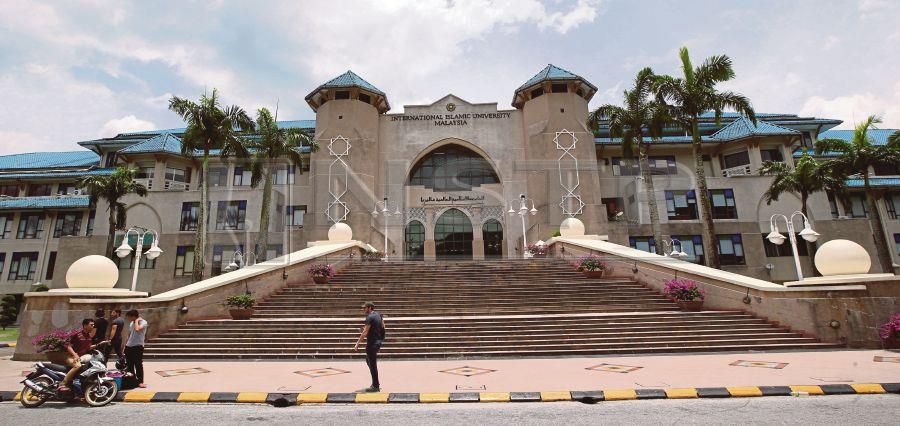Bringing Islamic forum to next level
Emeritus Professor Tan Sri Dato' Dzulkifli Abdul Razak
Opinion - The New Strait Times
February 16, 2019

A panel discussion in response to the 2019 World Economic Forum was held in conjunction with the International Islamic University Malaysia’s Institute of Islamic Thoughts and Civilisation International Seminar on Contemporary Thoughts and Societal Reform. NSTP/NURUL SHAFINA JEMENON
APANEL discussion in response to the 2019 World Economic Forum (WEF) held last week drew a number of insights.
The forum was held in conjunction with International Islamic University Malaysia (IIUM)’s Institute of Islamic Thoughts and Civilisation (ISTAC) International Seminar on Contemporary Thoughts and Societal Reform.
Noting that the forum, started modestly some 40 years ago, has now turned into a world renowned stage to talk about the “future” of the world at large, what does it mean for us? It was very much a European platform when it all began, but now it has a global reach and attention. Yet not all got represented, given the inherent biases (and exorbitant fees) linked to it where mostly the rich and (in)famous have better chances to be included. In other words, only a certain genre of voices took to the air while others had to be content to be listening posts, often not taken seriously.
Still, to its credit, WEF has gained so much spheres of influence that many seemed eager to please. Take the Fourth Industrial Revolution (4IR, which was reviewed previously) as among the latest examples. That was three years ago when it took many (largely developing) countries by storm following its pronouncement by the WEF founder. Malaysia was one of the most eager to jump onto the bandwagon without a blink. But only to find out this year that the forum was warned of an imminent battle between the robots and humans. And the possibility that the latter could be made slaves of the former: something that has been lingering in the minds of most for a long, long time but no one cared until WEF once again spoke. So much so it triggered a special discourse on the Fourth Social Revolution, as a counter balance to the excesses of the 4IR. What do we do now?
If the battle is read as one between “artificial” intelligence (AI) and “primordial” intelligence (PI), then the implications are even more severe and dehumanising should the latter is subjugated by AI. After all, PI is what humans and being human is all about. Some called it fitrah, others karma or simply spiritual force. No matter. It is a testimony that we are different and consciously living so. While robots driven by AI can make no such claims, they can allegedly supersede us, raising several more questions that remain unanswered bordering on ethics and morality.
This is where ISTAC comes into the picture as a well recognised institute in this part of the world, at least. More importantly, known for its different points of view and context from the perspectives of Eastern traditions and wisdom. Similarly, it is not a coincidence, for example, that Japan has been talking about Society 5.0 instead. More ironic coming from a very technologically advanced nation. In other words, a more organised platform in this part of the world can provide a larger vista when WEF is deemed unable/unwilling or even failing to articulate. At once, we need not jump onto any bandwagon at the snap of a finger until we are fully informed of the possible outcomes, especially those with a so-called “revolutionary” proposition.
The epic revolution, figuratively speaking, came to question when Sir David Attenborough admitted: The Garden of Eden is no more — in setting the tone of the conference as it were. In no uncertain terms he called on WEF to do more about the ever-threatening climate disasters due to unabated global warming and unscrupulous business practices. Particularly, in view of the fact that most of the WEF participants are themselves (in)directly related as the causal factors. What is clear, this pushes us to a new Anthropocene era where humans are designing their own extinction slowly but surely by undermining their own civilisations.
For the longest time, humans under the Holocene era have been toiling to build new inhabitable spaces, turning them into civilisations as we know it today. It was supported by stable climatic conditions with minimal fluctuations enabling humans to progress by balancing one civilisation with another and in turn linking humankind into an interconnected global community. This, however, is currently being slowly dismantled by strained ties and the recoiling into “cocoons” protected by “me-first” attitudes and policies to the detriment of others, especially the weak and marginalised. Was it not during WEF since several years ago that bodies like Oxfam persistently reminded us that the world’s assets are increasingly concentrated in the hands of small group of (white) men residing in the Western hemisphere? Should this continue at the behest of some vested interest, WEF will lose its appeal. That time is here, according to some opinions.
If that is the case, ISTAC needs a bold new strategy to move forward to fill the vacuum as endorsed by the four-member panel on behalf of the audience.
Emeritus Professor Tan Sri Dzulkifli Abdul Razak is a Fellow of the Centre for Policy Research and International Studies, Universiti Sains Malaysia, and rector of the International Islamic University Malaysia
